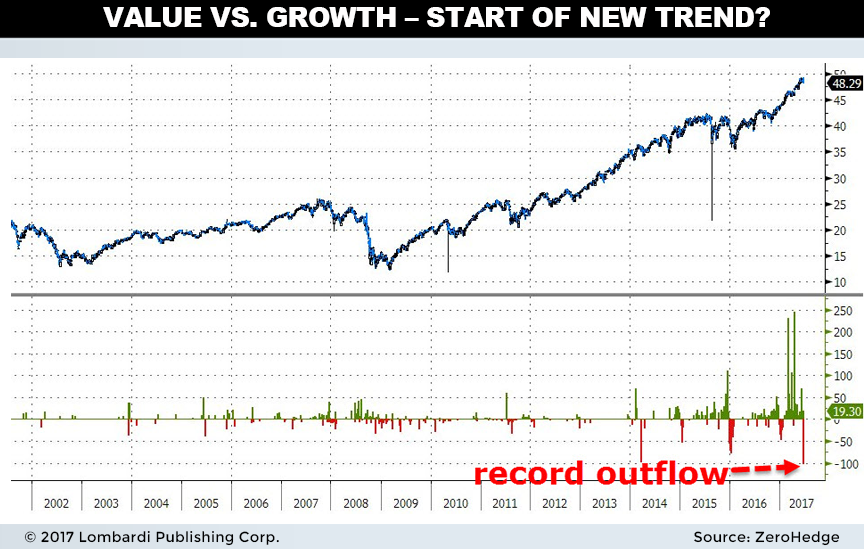Market Collapse in Growth ETF Inflows Is a Bad Omen for Big Tech
It had to happen. Investors en masse pressed the panic button on growth stocks, sending high-flying tech issues into a tizzy. Record outflows in the iShares Russell 3000 Growth Index (ETF) (NYSEARCA:IUSG) were the most since inception, creating a temporary market collapse in individual issues. This is just a preview of things to come if sustained selling enters the market.
As Bloomberg reports, investors yanked around $103.0 million from the ETF in late June 2017, and this was enough to cause chaos. The NASDAQ index dropped around two percent peak-to-trough. The poster child of overvalued tech stock—the so-called FANGs (Facebook Inc (NASDAQ:FB), Apple Inc. (NASDAQ:AAPL), Netflix, Inc. (NASDAQ:NFLX) and Google)—lost anywhere from four percent to 10% of market capitalization before recovering. Some would describe the downward moves as disorderly, bordering on panic selling at times.
The interesting thing is, the record selling comes on the heels of record buying, just two short months earlier. It just shows how bipolar the market has become. Investors are chasing returns, not content to wait for valuations to correct. This is never a strong basis for a stable stock market.
As we see, at the first whiff of panic, investor trip over themselves to sell their positions. Unstable markets are one of the telltale characteristics of late-stage bull markets coming to an end. Stocks thrash and flail as bulls and bears dig in for battle. Trillions of dollars are on the line. It’s akin to a star shining brightest before the supernova implodes it from within.
Also Read:
Stock Market Crash 2017? This Could Trigger a Stock Market Collapse
5 Signs of a U.S. Economic Collapse in 2017
And to think, all this was caused by a measly $103.0 million outflows. For an ETF with $2.38 billion in market capitalization, it’s not an insignificant amount of selling, but it isn’t overly extreme either. We wonder how bad the carnage will be when much larger outflows enter the picture. This was like a tremor before the big earthquake; enough to cause very minor damage, but more importantly, warning us of larger impending danger ahead.
Value vs Growth
Could the great rotation be underway? An interesting sidebar to the market collapse in tech was the notable outperformance in “value” stocks. Of course, these issues have been completely neglected by the market since the Great Recession ended. It’s been so bad, several notable value-based funds have shut down due to lagging performance.
After losing out to growth month after month, value is outperforming in June 2017. As of this writing, value stocks have gained 0.72% this month, versus -0.58% for growth. Not yet enough to call a trend, but all trends must start somewhere. (Source: “Investors Just Panic-Dumped “Growth” Stocks As ETF Outflows Hit Record High,” Zero Hedge, June 28, 2017.)
Should the trend continue, this should bode well for precious metals. Gold, silver, and platinum are one of the few remaining undervalued assets with real intrinsic value. As an added bonus, they will help safeguard purchasing power should more monetary debauchery lay waiting. Gold prices moved from the high $600.00’s/ounce to almost $2,000 based largely on debt monetization and an expanded Federal Reserve balance sheet following the Great Recession. Anybody who doesn’t believe the Fed would eventually attempt to intervene during another market collapse is not paying attention. Central Bank intervention is as sure as death and taxes.







